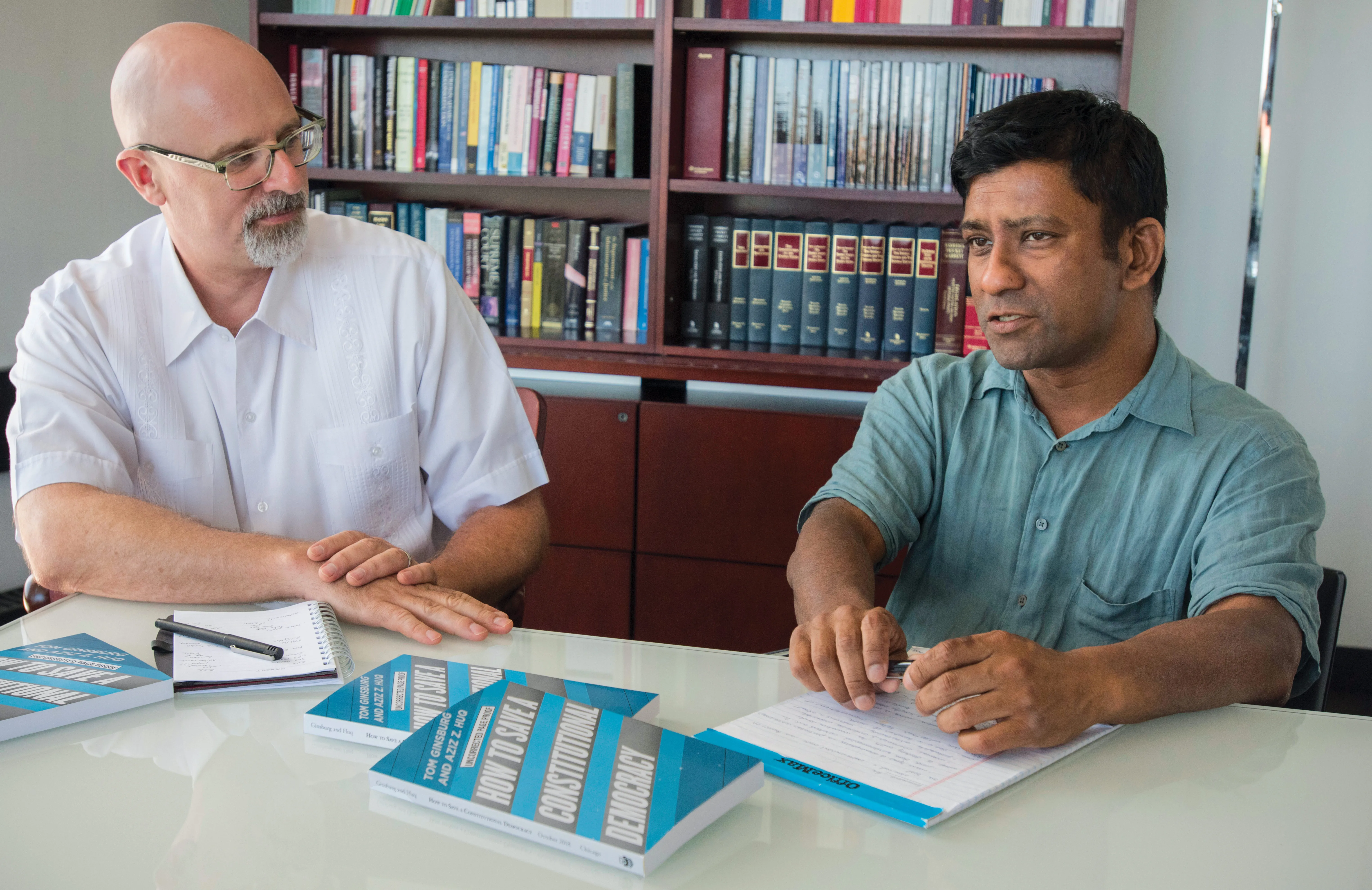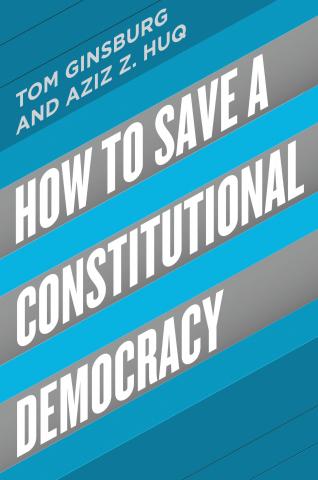How to Save a Constitutional Democracy

Without the necessary tools, it may be difficult to know whether a democracy is actually in peril. The question of democratic quality in the United States has come up often since the 2016 presidential election, and in their forthcoming book, How to Save a Constitutional Democracy, Tom Ginsburg, the Leo Spitz Professor of International Law and Ludwig and Hilde Wolf Research Scholar; and Aziz Huq, the Frank and Bernice J. Greenberg Professor of Law and Mark Claster Mamolen Teaching Scholar, provide the tools to help answer this question. Drawing from their expertise in constitutional design, federal courts and legislation, and comparative and international law, Huq and Ginsburg explore the structure, decline, and preservation of democracy, not just in the United States, but throughout the world. Earlier this summer, Claire Stamler-Goody, the Law School’s assistant director of communications, sat down with them to discuss their new book and ask just how close the United States is to losing its constitutional democracy.
Stamler-Goody: In the wake of Donald Trump’s election, many Americans began to question the state of democracy in their country, and these questions have persisted well into his presidency. What nuance do you hope your book will add to these conversations?
Huq: We set out to write a book about the more general phenomena, not just behind the 2016 election, but behind Brexit, the rise of autocratic populism in Eastern Europe, and events happening as far afield as in India, Japan, and Israel. We want to provide not just an academic reader, but also a general reader, with an understanding of the forces that have brought liberal democracies to this junction, as well as the role that law and constitutions play in that process.
Ginsburg: We’re also trying to step beyond the immediate day to day. Right now, the news cycle is extremely fast, and we’re hoping we’ve written a book that will endure and be useful in a lot of different contexts for many years.
Stamler-Goody: Why did you decide to write this book together?
Huq: We both have long-standing interests in domestic and international law and in comparative constitutional law. But really, I think the book is a product of the Law School’s culture of collaboration. It’s a product of thinking across disciplinary and subject-matter boundaries, and wanting to use the available tools to tackle whatever the hard problem of the day is.
Stamler-Goody: You resist the idea that democracy can be boiled down to just the presence of competitive elections, saying that freedom of speech and association, as well as integrity of the rule of law, are also required. How did you decide on this definition, and what are some things that happen when these qualities disappear?
Ginsburg: I think our contribution as lawyers is to recognize that democracy is legally constructed—it depends on a robust set of legal rights and legal institutions. So the rule of law is something we would naturally emphasize. In the recent rounds of constitutional backsliding, the tools used by authoritarians are legal in nature. It’s not a coup that ends democracy overnight or a break in the legal continuity. They are using tools that are already within the legal system.
Huq: There’s a very minimal definition of democracy associated with the scholar Adam Przeworski to the effect that, in a democracy, you don’t know who’s going to win before an election happens. I find that concept helpful. When the administrator of an election is in the pocket of the ruling party and is willing to corrupt the process of counting ballots to help that party, you’re not going to have a competitive election.
In terms of free speech and association, if you have a ruling party that essentially controls the media space and determines whose views are represented—and this was true in the recent Turkish elections—you may have an election that has some elements of competitiveness, but is not truly competitive. If you have a ruling party that locks up its leading competitors, as Daniel Ortega did in Nicaragua in 2016, you’re not going to have an election that before the fact was truly uncertain.
One of the fallacies that we hope this book dispels is that it’s easy to tell when a democracy has tipped over the edge. There’s actually a broad range of possible outcomes at the end of a democratic backsliding. You can have something that looks, superficially, a lot like a competitive democracy—in Hungary and Poland, for instance, their policies in some ways don’t look terribly different from those observed today in Austria or Germany. There isn’t one end state. There are a variety of different ways in which, as Tom said, laws and constitutions can be used to unravel democracies from within.
Stamler-Goody: You say that “the antidemocrat’s toolkit has become more sophisticated of late.” How so?
Ginsburg: In terms of constitutional design, democracies innovate and authoritarians copy. Authoritarians are sophisticated in that they are learning how to use democratic forms for undemocratic ends. Ten or 20 years ago, people were talking about the end of the Chinese Communist Party or China breaking apart. Instead, it’s become an extremely resilient, sophisticated governance operation that uses all available tools—technological, legal, political, and ideological—to sustain its rule.
Huq: One thing that populists have learned is that if you make the right set of changes to the judiciary, you can fundamentally undermine its effectiveness as a check on an elected entity that wants to entrench itself. An example of this comes from Hungary and Poland, where the populist parties running those two polities enacted constitutional amendments that subtly shifted the selection processes of their judiciaries. In other words, they’ve learned how to take the facially innocuous instruments of legislative and constitutional change and strategically deploy them to undermine the effectiveness of democratic competition.
Stamler-Goody: One of the mechanisms of democratic erosion that you discuss is charismatic populism, which you say is having a global renaissance. Why do you think that is?
Ginsburg: It might have something to do with the decline of traditional party structures. A big part of the story is that parties have grown out of touch, and that the technology of mass parties makes much less sense in an era where left-right distinctions are changing. Whenever you have a changing party system, you have an opportunity for something to fill the void. The populists have come in, in many cases all over the world, to tell people that the reason they have less control over their lives is because of some nefarious globalist elite. Charismatic populists will put themselves forward as the cure for that. Emphasizing this sort of unity of the people can be pretty dangerous, even though we recognize that it’s grounded in a genuine need for accountability.
Stamler-Goody: You say that there is a tension in constitutional design between addressing the risk of erosion and pursuing policy responsiveness and flexibility. Is it possible to have both? Are there any constitutions that come close to achieving this balance?
Huq: One of the places to think about this is in terms of the amendment rule for constitutions. Scandinavian constitutions have a multiple votes system, where a constitutional amendment is proposed but isn’t ratified until a second vote that comes after a new set of elections. This gives more time for a process of deliberation to occur, and it allows popular sentiment to play a larger role. It’s by no means foolproof, but nothing is foolproof. At the very least it’s a way to allow for flexibility while also allowing groups that would otherwise be excluded or pushed to the margins to press for the preservation of the democratic system.
Stamler-Goody: The subject of vagueness or ambiguity in constitutions comes up often throughout the book, in that it can leave the rules open to interpretation and allow potential authoritarians to further consolidate their power. Would you argue that constitutional language should be as specific as possible? Are there any risks in using very specific language?
Ginsburg: We might want constitutions to be more specific to avoid exploitation of that vagueness. But obviously there is a danger in too much specificity. It can be too rigid, and the constitution may not adjust properly when new forces arise. We don’t have a general prescription on the optimal level of specificity, but we do note that one of the risks in the United States is that our document is extremely vague and doesn’t answer some of the most basic questions, such as, can a president pardon him or herself? Or, can a president be indicted? If we were rewriting our constitution, we would want more specificity on these sorts of points because they will be critical in determining whether democracy survives.
Huq: One of the hard things about constitutional design is that you don’t know what a critical point will be until it happens. It turns out that took 220-odd years before we had a president who suggested that he would pardon himself while also protesting his innocence. It’s not that these points aren’t obvious, but more that they aren’t relevant until the possibility comes onto the horizon. It’s exceedingly hard to figure out what exactly is going to be relevant until it is.
Stamler-Goody: The idea of American Exceptionalism may imply that the US is immune to the threats to democracy that plague other countries. How different is the US, and do these differences protect it from democratic decline or actually put it at a greater risk?
Huq: On the one hand, I don’t think there’s any reason to believe that the pressure of social change and the social stress of global economic transformations will spare the United States. If those are the things pushing a two-party system toward failure, and I think there’s some evidence of that, then it’s not clear why one would think that the United States is different.
On the other hand, we have a very old constitution, which you might think is a good thing, but it probably isn’t. The technology in our constitution is essentially a 19th-century technology, and it hasn’t been updated in 200 years. Or, it’s been updated, but only at the margins and only by judicial decisions, which isn’t quite the same thing. And that probably makes us more vulnerable. At the same time, there is some evidence that having a longer history of democratic competition inures a country to the risks of democratic backsliding. Younger, poorer democracies are more vulnerable than older, wealthier ones. That cuts in favor of the United States.
But even that shouldn’t be overestimated. The United States has a long and robust tradition of authoritarianism and one-party rule across the South, and it has a long tradition of excluding people from the franchise—be they people who are poor, women, or people of color. We have a long tradition of openly racist immigration laws that keep people out on the basis of their ethnicity or national origin. If you look at the long democratic history of the United States, it’s not really clear which way it cuts.
Stamler-Goody: How close is the United States to losing its constitutional democracy?
Ginsburg: I’m actually somewhat optimistic in the midterm. One of our points is that institutions and constitutions cannot save democracy. They can act as speed bumps to prevent backsliding from accelerating, but they can’t do everything on their own. Only democracy can save democracy. There are signs that people are mobilized and engaged in the issues on both parties, which we think is ultimately what’s necessary for democracy to thrive and survive. But I also think it would be naive to argue that there’s not a serious risk.
I should note that political scientists who rate democracies, cross-nationally and across time, have downgraded American democracy recently. The Economist Intelligence Unit last year had us fall from the rank of Full Democracy to a Flawed Democracy, largely on the basis of the way we run the elections. According to Bright Line Watch, most Americans rate us really badly on a number of features of democracy, including the way we run elections, the way we draw districts, the way we do campaign finance, and many other things. So this isn’t just academics pointing this out. It’s a real felt thing out there. But I do believe that if people react and mobilize for change, we could be at the dawn of a new era of reform.
Huq: I would say that it’s not a binary—it’s not either we’re a constitutional democracy or we’re not. You can have a democracy that’s not particularly good, and there’s no reason that it needs to collapse into an autocracy or improve toward a better state. We can have a bad democracy that fails on multiple margins for as long as most of us will be alive.
More recently in the United States, there has been a substantial weakening of the institutions at the federal level that are meant to promote the rule of law: the Justice Department and the coercive instruments of the federal government. At this point, that damage is done. Some of it can be mitigated in the future, but it’s like getting an injury—once you’re injured, you’re injured. You can’t undo that. You could heal, but oftentimes the healing process is partial. Just to be clear, I don’t think that there’s a null possibility of a catastrophic end state, but do I think that everything is going to be better in the future? No, I don’t think that at all.
Ginsburg: I guess you could say there are some internal tensions between us. The optimist versus pessimist.
Huq (laughing): This has happened with us before.
Stamler-Goody: If you could make just one or two structural changes to the US government that would help preserve democracy, what changes would you make?
Ginsburg: One thing would be to take the drawing of the legislative districts and management of elections away from a partisan body. Everyone agrees that this harms the quality of democratic responsiveness, but the Constitution assigns the power to the state legislatures. This was written at a time before there were parties—they couldn’t have imagined that it would end up this way. So that would be one very important thing. The other thing I’d say would be to reduce the terms of Supreme Court justices to something like 15 or 18 years. This has been widely vetted in academia, and it would end the joke of an appointments process that we have right now.
Huq: I think we need to revisit the assumptions about how presidents get removed. We argue that other countries recognize that policies can get things wrong and that it’s possible to select bad leaders. We need mechanisms for dealing with bad leaders. We suggest in the book that impeachment could be reformed or reimagined to make it closer to what the framers thought it would be, which was that it would be used much more often than it has been. We also believe that the kind of robust accountability institutions, like the prosecutors for internal abuse that exist in South Africa and other constitutional democracies, are a good idea.
Stamler-Goody: You provide numerous examples in the book demonstrating that the executive is often the driving force for democratic decline. Knowing this, are there any reasons to favor a presidential government over a parliamentary one?
Ginsburg: If you look at the cases of backsliding, they happen in all different kinds of governments. You have parliamentary Hungary, you have semipresidential Poland, and you have presidential Venezuela. Turkey has toggled between the two. There’s no system that is foolproof. In the book, we do offer a tentative case for parliamentary government as a way of giving voice to populist and extreme forces without letting them take over the whole system. In a presidential system, the outsiders don’t have any power until they have all the power.
Stamler-Goody: What do you most hope your readers take away from the book?
Huq: That they’ll better understand the role that law and constitutions play in either supporting or undermining our democracy, and the fact that we have to make intelligent choices about law and constitutions.
Ginsburg: Agreed, and I’ll add one other thing: all is not lost.



